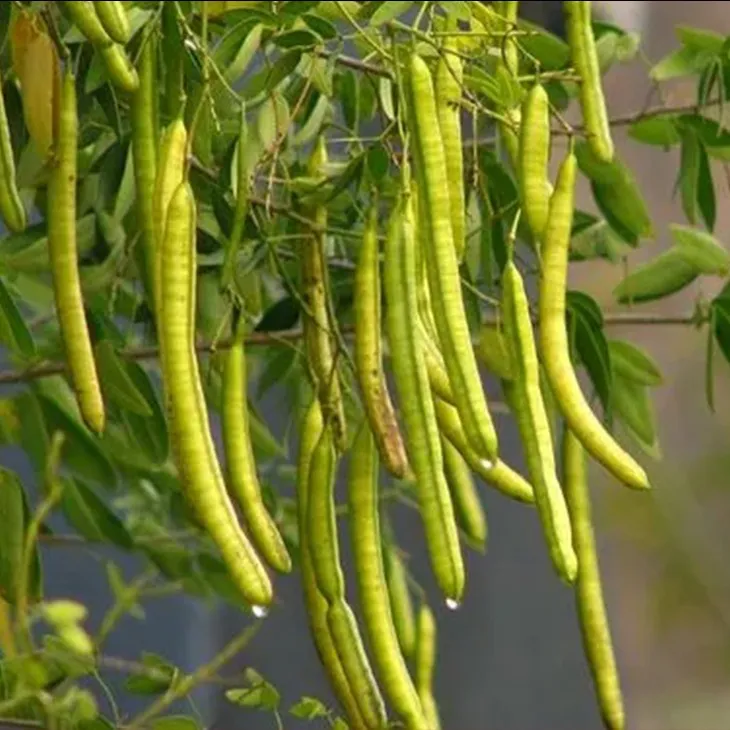- 0086-571-85302990
- sales@greenskybio.com
Use cassia seed extract? Make sure you source from sustainable suppliers!
2024-12-18

1. Introduction
The demand for Cassia obtusifolia extract has been steadily increasing in various industries, including the pharmaceutical, cosmetic, and food sectors. This is due to its numerous beneficial properties, such as antioxidant, anti - inflammatory, and laxative effects. However, as the consumption of this extract grows, it is crucial to consider the source of the raw material. Sustainable sourcing from reliable suppliers is not only important for the long - term availability of Cassia obtusifolia extract but also for several other aspects related to environmental and social responsibility.

2. The Importance of Biodiversity Conservation
2.1 Cassia obtusifolia in the Ecosystem
Cassia obtusifolia is a plant species that plays an important role in the ecosystem. It provides habitat and food sources for various organisms. In its natural habitat, it may be part of a complex web of interactions with insects, birds, and other plants. For example, certain insects may rely on Cassia obtusifolia as a host plant for their larvae, and birds may feed on the seeds or insects associated with the plant.
2.2 Impact of Unsustainable Harvesting
- If Cassia obtusifolia is harvested unsustainably, it can disrupt the ecosystem. Over - harvesting may lead to a decline in the plant's population, which in turn can affect the organisms that depend on it.
- It can also cause a reduction in genetic diversity within the species. A smaller population may have less genetic variation, making the species more vulnerable to diseases, pests, and environmental changes.
2.3 Sustainable Suppliers and Biodiversity
Sustainable suppliers play a vital role in conserving biodiversity. They follow practices that ensure the long - term survival of Cassia obtusifolia. For instance:
- They may implement sustainable harvesting techniques, such as only harvesting a certain percentage of the plant population each year. This allows the plant to reproduce and maintain a stable population.
- Some sustainable suppliers may also engage in reforestation or habitat restoration projects related to Cassia obtusifolia. By doing so, they contribute to the overall health of the ecosystem.

3. Fair Trade Practices
3.1 The Concept of Fair Trade
Fair trade is an important aspect of sustainable sourcing. In the context of Cassia obtusifolia extract, fair trade ensures that all parties involved in the supply chain are treated fairly. This includes the farmers or collectors who harvest the Cassia obtusifolia seeds, the processors, and the end - users. Fair trade aims to provide a fair price to the producers, which enables them to have a decent standard of living and invest in the sustainable management of the resource.
3.2 Challenges in the Absence of Fair Trade
- Without fair trade, farmers may be forced to accept low prices for their Cassia obtusifolia harvest. This can lead to a cycle of poverty, as they may not have enough income to improve their farming practices or support their families.
- It can also result in unethical practices, such as child labor or exploitation of workers. In some regions where Cassia obtusifolia is harvested, if the economic situation of the farmers is desperate, they may resort to using child labor to increase their output.
3.3 How Sustainable Suppliers Promote Fair Trade
Sustainable suppliers are committed to fair trade practices. They:
- Pay a fair price to the farmers or collectors. This price is often based on the true cost of production, including environmental and social costs.
- Provide training and support to the producers. For example, they may teach farmers about sustainable harvesting methods or help them improve the quality of their harvest, which can increase their income in the long run.
- Ensure transparency in the supply chain. By doing so, they can trace the origin of the Cassia obtusifolia extract and ensure that all parties are following fair trade principles.

4. Maintaining a Stable Supply Chain
4.1 The Role of Stable Supply Chains
A stable supply chain is essential for the continuous availability of Cassia obtusifolia extract. In industries such as pharmaceuticals and cosmetics, a consistent supply of high - quality extract is crucial. If there are disruptions in the supply chain, it can lead to production delays, increased costs, and potential shortages of products containing the extract.
4.2 Risks in an Unstable Supply Chain
- One of the main risks in an unstable supply chain is the over - reliance on a single source. If a company sources all of its Cassia obtusifolia extract from one region or supplier, and that source is affected by factors such as natural disasters, political instability, or changes in regulations, it can cause a significant disruption.
- Quality control can also be a challenge in an unstable supply chain. If the supply is inconsistent, it may be difficult to ensure that the extract meets the required quality standards.
4.3 Sustainable Suppliers and Supply Chain Stability
Sustainable suppliers contribute to supply chain stability in several ways:
- They often have multiple sources of Cassia obtusifolia. This diversification reduces the risk of supply disruptions due to local issues in a single area.
- They invest in the long - term relationships with farmers and other partners in the supply chain. By providing support and fair prices, they ensure the loyalty of their suppliers, which helps in maintaining a stable supply.
- They also follow strict quality control measures throughout the supply chain. This ensures that the Cassia obtusifolia extract that reaches the end - users is of consistent quality.

5. Identifying Sustainable Suppliers
5.1 Certification and Standards
One way to identify sustainable suppliers is to look for relevant certifications and standards. For example, some organizations offer certifications for sustainable harvesting and fair trade. These certifications indicate that the supplier has met certain environmental, social, and economic criteria. Some well - known certifications in the field of natural products include Fairtrade International and the Forest Stewardship Council (FSC) - related certifications if applicable to the cultivation or harvesting of Cassia obtusifolia.
5.2 Supplier Reputation and Track Record
- The reputation of a supplier is also an important factor. A supplier with a long - standing positive track record in sustainable practices is more likely to be a reliable source. This can be determined by looking at their past relationships with customers, their involvement in community development projects, and their compliance with environmental regulations.
- References from other industry players can also be valuable. If other companies in the same field have had positive experiences with a particular supplier, it is a good indication of their reliability.
5.3 Transparency in the Supply Process
A sustainable supplier should be transparent about their supply process. This includes:
- Providing information about the origin of the Cassia obtusifolia, including the location of the farms or collection areas.
- Sharing details about their harvesting and processing methods, such as whether they use sustainable techniques and how they ensure quality control.
- Being open about their pricing structure and how they ensure fair trade for all parties involved.
6. Conclusion
In conclusion, as the use of Cassia obtusifolia extract continues to rise, it is of utmost importance to source it from sustainable suppliers. Sustainable suppliers play a crucial role in biodiversity conservation, promoting fair trade practices, and maintaining a stable supply chain. By choosing sustainable suppliers, companies can not only ensure the long - term availability of the extract but also contribute to environmental and social sustainability. It is essential for businesses and consumers alike to be aware of the significance of sustainable sourcing and take the necessary steps to support it.
FAQ:
What is Cassia obtusifolia extract?
Cassia obtusifolia extract is a substance derived from the Cassia obtusifolia plant. It contains various bioactive components and has been increasingly used in different industries, such as the pharmaceutical and cosmetic industries for its potential beneficial properties like antioxidant and anti - inflammatory effects.
Why is sourcing from sustainable suppliers important for Cassia obtusifolia extract?
Sourcing from sustainable suppliers is crucial for several reasons. Firstly, it helps in biodiversity conservation. Unsustainable harvesting can lead to the depletion of Cassia obtusifolia plants in the wild, which can disrupt the ecological balance. Secondly, sustainable suppliers are more likely to follow fair trade practices, ensuring that the local communities involved in the collection or cultivation of Cassia obtusifolia are fairly compensated. Thirdly, they play a key role in maintaining a stable supply chain, which is essential for industries relying on this extract.
How can one identify a sustainable supplier of Cassia obtusifolia extract?
To identify a sustainable supplier, one can look for certain certifications. For example, some environmental certifications indicate that the supplier follows sustainable harvesting and production methods. Also, a sustainable supplier is likely to have transparent supply chains, which means they can provide information about the origin of the Cassia obtusifolia, how it is cultivated or collected, and the social and environmental impacts of their operations. Additionally, positive reviews from other customers regarding their sustainability practices can be a good indicator.
What are the potential consequences of not sourcing Cassia obtusifolia extract from sustainable suppliers?
If the extract is not sourced from sustainable suppliers, there could be negative impacts on the environment. Over - harvesting may lead to the extinction of Cassia obtusifolia in some regions, which can have a cascading effect on the ecosystem. Moreover, unfair trade practices may occur, exploiting local farmers or collectors. In the long term, the lack of a sustainable supply chain can also lead to shortages of the extract for industries relying on it, causing disruptions in production and potential economic losses.
Are there any regulations regarding the sustainable sourcing of Cassia obtusifolia extract?
There may be some regulations in certain regions. These regulations can cover aspects such as the permitted harvesting levels to ensure the long - term survival of the plant, requirements for fair treatment of workers involved in the supply chain, and environmental protection measures during the extraction process. However, the enforcement and comprehensiveness of these regulations can vary from place to place.
Related literature
- Sustainable Sourcing of Botanical Extracts: A Case Study of Cassia obtusifolia"
- "The Importance of Sustainable Suppliers in the Cassia obtusifolia Extract Industry"
- "Biodiversity Conservation and Cassia obtusifolia Extract Sourcing"
- ▶ Hesperidin
- ▶ citrus bioflavonoids
- ▶ plant extract
- ▶ lycopene
- ▶ Diosmin
- ▶ Grape seed extract
- ▶ Sea buckthorn Juice Powder
- ▶ Beetroot powder
- ▶ Hops Extract
- ▶ Artichoke Extract
- ▶ Reishi mushroom extract
- ▶ Astaxanthin
- ▶ Green Tea Extract
- ▶ Curcumin Extract
- ▶ Horse Chestnut Extract
- ▶ Other Problems
- ▶ Boswellia Serrata Extract
- ▶ Resveratrol Extract
- ▶ Marigold Extract
- ▶ Grape Leaf Extract
- ▶ blog3
- ▶ blog4
- ▶ blog5
-
Pure 85% Tomentil Extract.
2024-12-18
-
Hawthorn powder
2024-12-18
-
Red Vine Extract
2024-12-18
-
Buckthorn bark extract
2024-12-18
-
Dandelion Leaf Extract
2024-12-18
-
Sea buckthorn oil
2024-12-18
-
Sophora Flavescens Root Extract
2024-12-18
-
Lemon Juice Powder
2024-12-18
-
Echinacea Extract
2024-12-18
-
Sophora Japonica Flower Extract
2024-12-18
-
Ivy Extract
2024-12-18





















